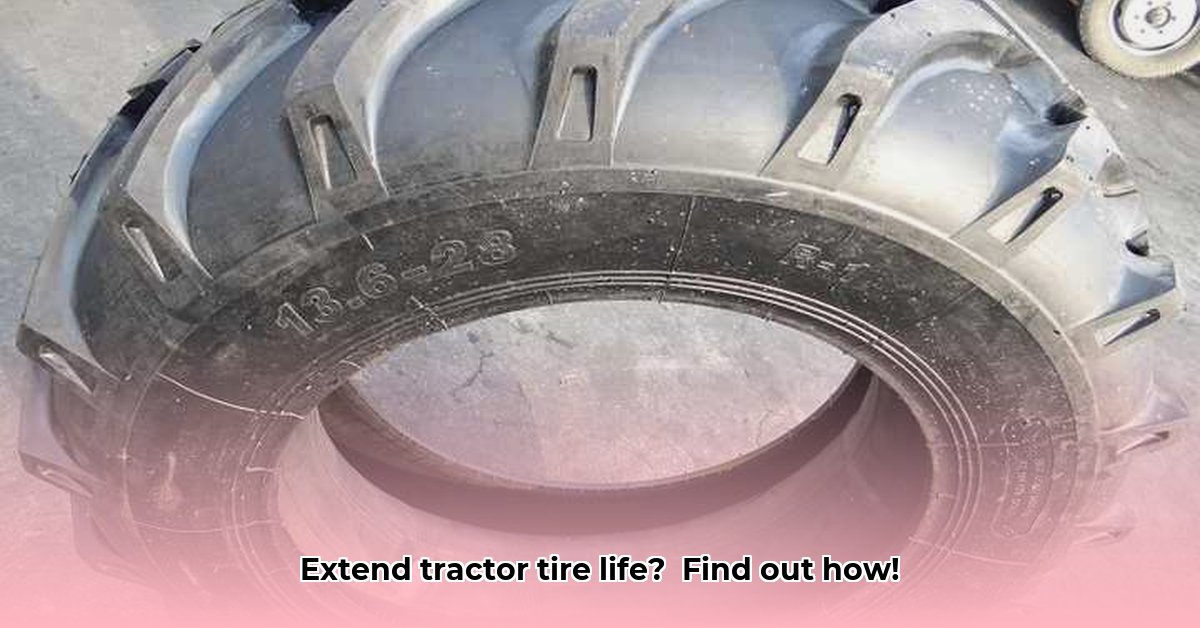
11.2-38 Tractor Tires: Balancing Performance and Sustainability
Farmers face constant pressure to increase efficiency and reduce costs. Tractor tires, crucial for field operations, represent a significant expense and environmental consideration. This article examines the Bridgestone Firestone Field & Road 11.2-38 tire, analyzing its performance claims, sustainability profile, and implications for the future of sustainable agriculture. We'll explore how to maximize tire lifespan and minimize environmental impact. For more on other brands, check out this page on John Deere tractor tires.
Tire Performance and Durability: The Firestone Field & Road Promise
Firestone's Field & Road tire promises enhanced durability through rugged construction, specialized rubber compounds, and an optimized tread design. These features aim to extend tire lifespan, reducing replacement frequency and associated costs. The manufacturer also claims improved traction, potentially leading to fuel savings. However, quantifiable data supporting these assertions remain limited. While anecdotal evidence suggests increased longevity, independent verification through rigorous field testing is necessary to validate the manufacturer's claims. Aren't verifiable data points crucial for informed decision-making by farmers?
Sustainability Assessment: A Critical Examination
While longer-lasting tires contribute to reduced waste, a truly comprehensive sustainability assessment requires a broader perspective. Currently, crucial data regarding the Firestone Field & Road 11.2-38 tire's environmental impact is lacking. This includes:
- Carbon footprint: A detailed assessment of greenhouse gas emissions across the tire's entire lifecycle (from raw material extraction to disposal) is needed.
- Material sourcing: Transparency regarding the origin and sustainability of raw materials is essential. Are recycled materials used? What is the environmental impact of material extraction?
- Recyclability: Information on the tire's end-of-life recyclability and the availability of recycling infrastructure is crucial. Can the tire be effectively recycled, or does it end up in landfills?
This lack of transparency prevents a complete evaluation of the tire's sustainability. How can farmers confidently choose sustainable options without access to this critical information?
Actionable Recommendations for Stakeholders
To promote sustainable practices, concrete steps are needed:
1. For Farmers:
- Implement meticulous tire maintenance schedules (including regular pressure checks) to maximize lifespan.
- Keep precise records of tire usage and performance to inform future purchasing decisions.
- Advocate for increased transparency and standardized sustainability reporting from tire manufacturers.
2. For Tire Manufacturers (like Bridgestone Firestone):
- Conduct and publicly release comprehensive lifecycle assessments (LCAs) for each tire model.
- Invest in research and development of sustainable materials, manufacturing processes, and end-of-life recycling solutions.
- Collaborate with agricultural organizations and policymakers to establish industry-wide sustainability standards.
3. For Government Agencies:
- Provide incentives for farmers to adopt sustainable tire practices, such as subsidies for eco-friendly tires or tire recycling programs.
- Establish mandatory sustainability reporting requirements for tire manufacturers.
- Invest in research and development to promote the innovation of more sustainable tire technologies.
Risk Assessment: Potential Challenges and Mitigation Strategies
Several risks are associated with incomplete sustainability information:
| Risk Factor | Mitigation Strategy |
|---|---|
| Unverified Sustainability Claims | Demand transparent lifecycle assessments (LCAs) from manufacturers; rely on independent verification. |
| Increased Soil Compaction | Proper tire inflation, soil testing, and adoption of appropriate tire technologies. |
| Higher Operational Costs | Explore alternative sustainable options; optimize tire maintenance routines. |
| Regulatory Non-Compliance | Proactive data collection, transparency, and industry collaboration with regulatory bodies. |
Regulatory Implications and Future Considerations
The absence of comprehensive sustainability data presents significant challenges for compliance with future regulations. Proactive data collection and transparency are crucial for manufacturers to avoid potential penalties and maintain market competitiveness. Future regulations may mandate detailed environmental impact reporting for agricultural tires, making comprehensive LCA data essential.
Conclusion: The Path Towards Sustainable Agriculture
Sustainable agriculture hinges on responsible practices across the value chain. The lack of comprehensive sustainability data related to 11.2-38 tractor tires highlights a critical gap in our knowledge. Increased transparency, rigorous research, and collaborative efforts are essential to move towards a future where environmental responsibility and agricultural productivity coexist. Only then can we make truly informed choices that benefit both our farms and our planet.